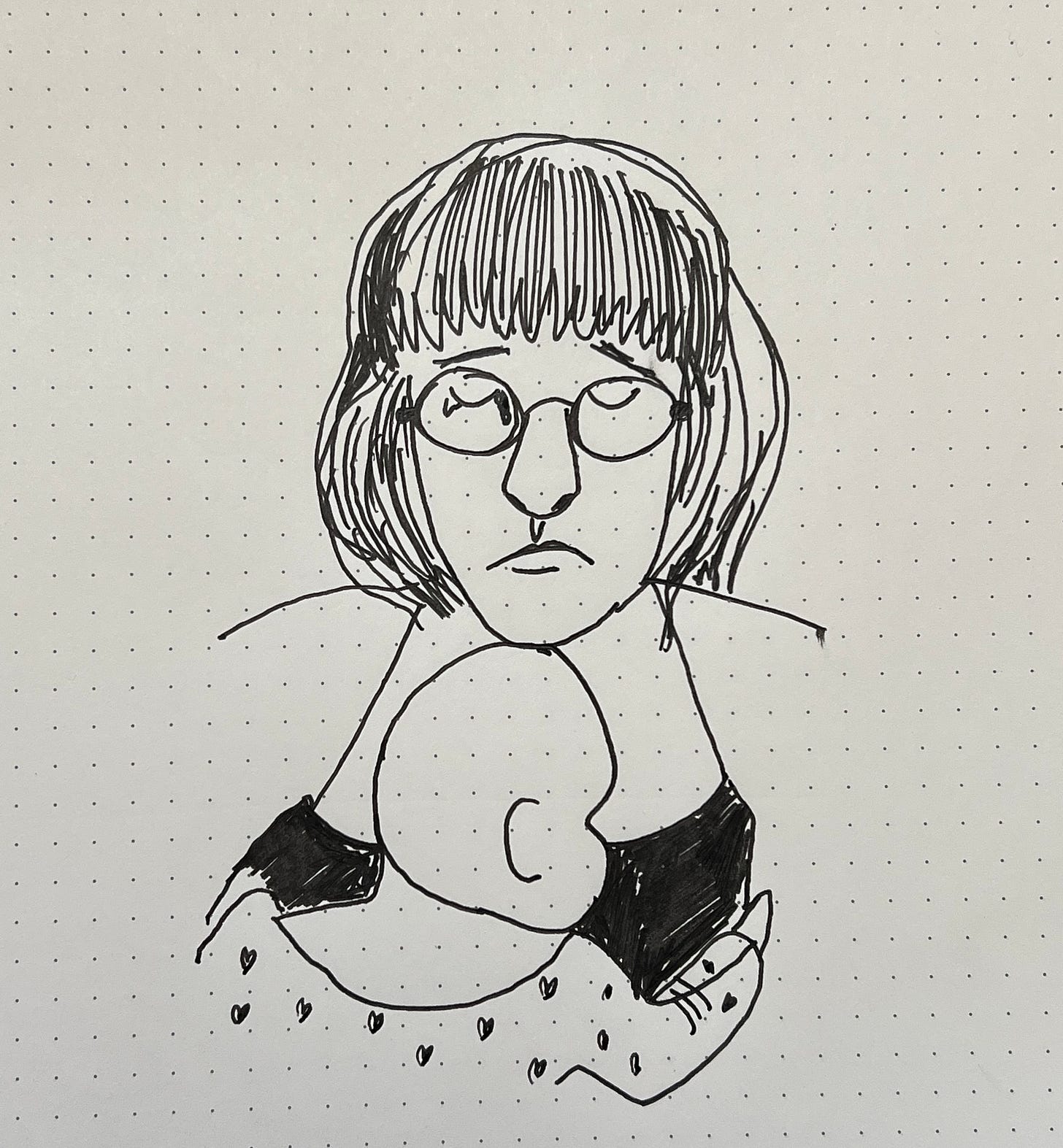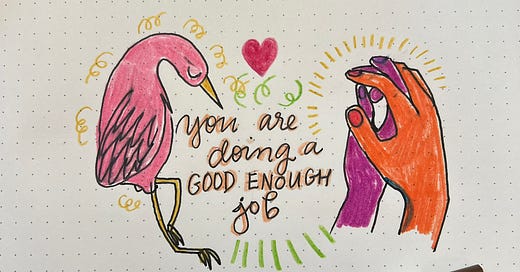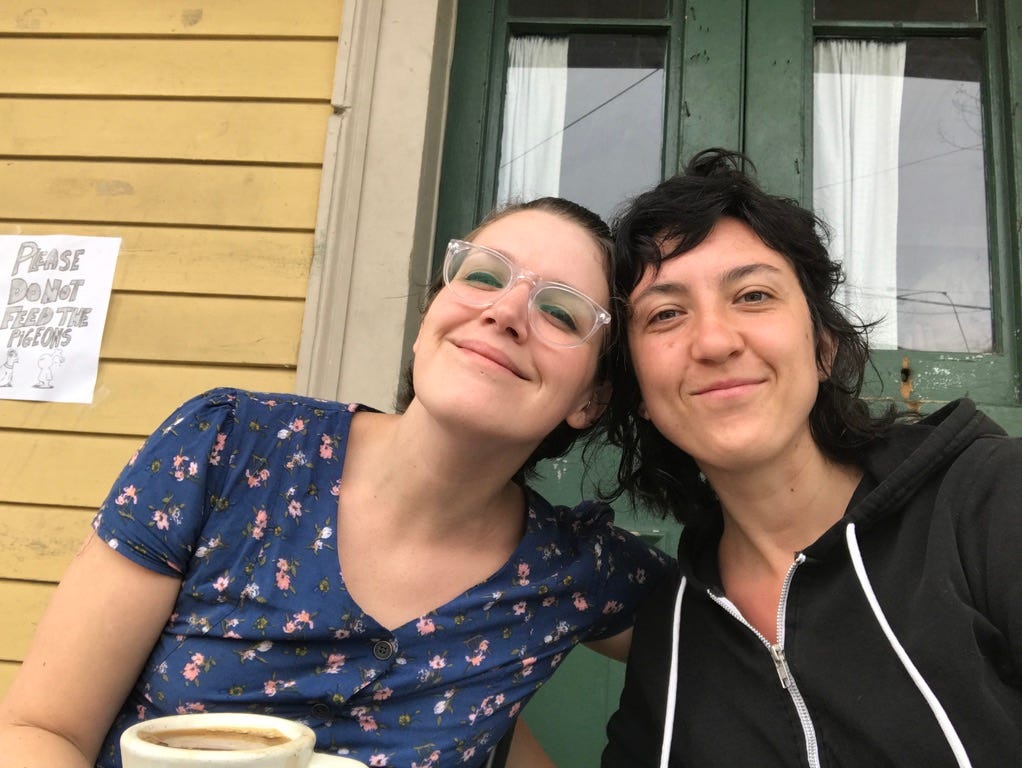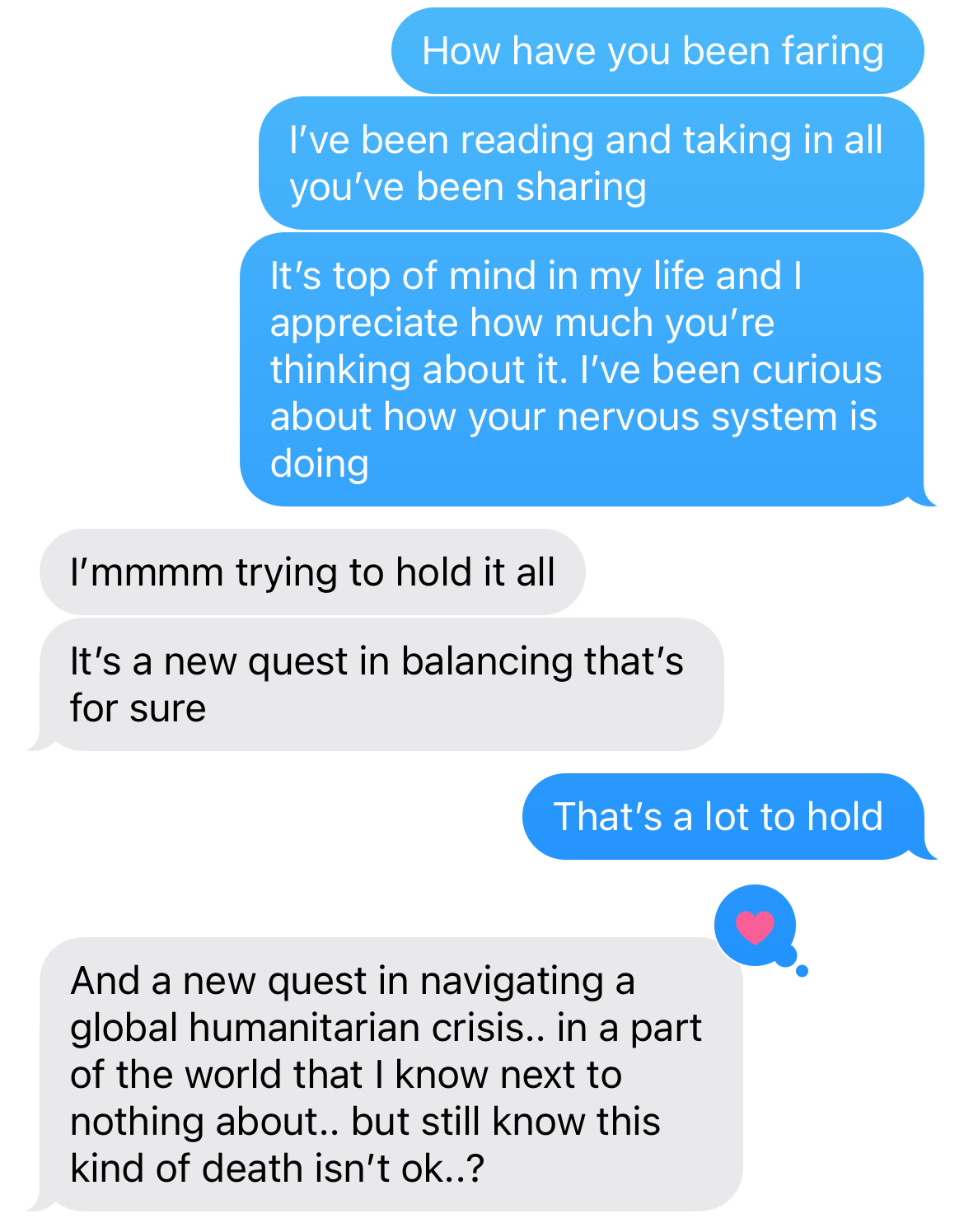What My Therapist Said When I Said I Wanted To Talk About Palestine
With Resources From My Friend Ari
A Note For You, If You’re Having A Bad Day
Dear Friend,
Last week, I told my therapist I wanted to talk about how to talk about Palestine.
I told her that I felt frozen; I wasn’t sure what I was supposed to do, and there seemed to be a moral right and wrong here. A lot of people I follow online have been making text-on-square posts that contain the word “shame.” As in: “If you are online posting about your own life during a global genocide, shame on you.” As in: “I am disgusted. If you’re reading this, you’ll know who you are. You don’t care about Palestine. I’m ashamed to know you.”
I do use social media to help me make money, and for my family, money has been really tight. I can hear the hypothetical response to that: “Money has been tight? AT LEAST YOU ARE ALIVE AND YOU HAVE ACCESS TO CLEAN WATER AND YOU ARE NOT SURE YOU ARE GOING TO DIE TOMORROW.” So I felt frozen. I wanted to discuss this with Sarah. (Which is not my therapist’s real name.)
“If you could be completely honest, what would you say about what’s happening in the world?”
I closed my eyes and tried to think about what was true for me. I wanted my own words, not words I’d read on the internet that expressed what I felt I was supposed to feel.
“I guess I would say that it was really, really sad. Sad isn’t remotely a big enough word. We belong to each other — we humans. I like to think of humanity as one enormous organism; when enough of humanity is aching from this level of violence and killing and destruction, how is it possible for all of us not to be aching?
“I’ve been seeing the pictures. I’ve never seen so many dead children. I didn’t know I would ever see so many dead children.”
I used to teach a journalism class session on journalistic photography, and to prepare, I’d scan list after list of The Most Important Photographs of All Time. I knew to brace myself, and still, of course, the images would break my heart. There’s a photo of a woman and her goddaughter falling from a building during a fire; it captures the last few moments that the woman was alive. There are photos of Vietnam: a Buddhist monk self-immolating; terrified children running screaming from an accidental napalm attack; a Vietcong fighter being executed by a calm chief of police. There’s the drowned Syrian boy, washing up on a Turkish Beach. I chose not to bring these photos to class, because I taught high schoolers, and I didn’t want to take from them the specific innocence that comes from not knowing how terrible human beings can possibly be. Terrible isn’t remotely a big enough word.
The photos from what’s happening now in Gaza are so much worse. I still subscribe to a paper newspaper, and the first pictures I saw were on its front page — a place with no crossed-out-half-moon “sensitive content” warning. One of the things about these photos, as many parents have written before me, is how much these children look like my child. When my daughter sleeps, my partner Luke and I sometimes zoom in the camera that’s installed in her safe, warm bedroom to make sure we can see her breathing. There are no children who are not perfect. There is no loss that could be more profound.
“Why don’t you write about that?” asked Sarah.
Because that doesn’t add anything. I am another sad mother. The mothers are all sad. In The New York Times, Amanda Hess writes more beautifully than I can about all of this. She says, “The motherhood school tells me that my job as an American mother is not to protest this suffering, or even to feel shame for it, but to absorb it. Maintain the normalcy of my own home, but sadly.”

I told Sarah that I often ask myself why I am posting the things I’m posting. I’m not in denial: Instagram and Substack are the ways I’ve chosen to engage in capitalism, and I really like them! The internet has connected me to people I’ve come to love. (You are one of these people.) Like all writers, I’m hoping to make work that tells some kind of truth; that gives words to feelings that other people have, but haven’t always been able to describe. I regularly fail at this, and that’s part of what’s amazing to me about a medium that’s so live: I appreciate the criticism, which is 99 percent of the time thoughtfully worded and kindly offered.
But I really don’t know what truth I have to offer about what’s going on in Gaza. No matter how much I read (and I read a lot!), I feel like I don’t know anything. Eve Ewing, whose writing I love more than probably anyone else’s writing, posted this to her Instagram story on Oct. 8:
Since reading that, I’ve hesitated to use words like “complicated,” “complex,” and “shades of gray.” But still, those are the words I want to use. I shouldn’t be this confused, but I am.
Here’s more from Hess’s article that struck me:
From the perspective of one journalist in Gaza, it is posts like mine — of my safe and happy kids — that feel unbearable and inappropriate. It’s sick, how easily we appear to move on. “The internet went down again and believe it or not I was happy,” the Palestinian photographer Motaz Azaiza wrote on his Instagram account after an October power outage in Gaza. “Because after what we show to the world they just said we are soo sorry and no one did a thing.” He had seen people share his photographs of Palestinians suffering, and then post images of themselves “having fun,” and he wanted them to know: “No need to share anything and we don’t want your pity!”
Sometimes, when I tap on a post from a journalist in Gaza, Instagram suggests next steps. “Are you sure you want to see this video?” it asks. It tries to point me instead to “resources” for coping with “sensitive topics.” It suggests a crisis hotline for disaster survivors and responders, but I am not a survivor or a responder. I’m a witness, or a voyeur. The distress I am feeling is shame.
The shame is what’s frozen me. The latest science on shame is that, while it can be a short-term motivator, the long-term costs are extreme: it’s bad for your health and your ability to continue on as a member of your social groups. I respond to shame by spiraling: “I’m bad, so what could I possibly do that’s worthwhile, what makes me think I have the right to speak, these questions I’m asking about myself are deeply selfish, I am fundamentally poisonous, I’m not sure there’s a point to my continuing on.” (It’s good I have a therapist.)
*
My friend Ari gave birth to her son just days before I gave birth to my daughter. I think of our children as witch-twins, because we talked about them more than a decade before they were born (“Do you want babies?” “I don’t know?” “It would be cool if we had babies at the exact same time”) and in my mind, Ari and I are inextricably linked.
Ari has been posting about Palestine a lot, and initially, I wondered if she was angry with me for my own seeming lack of decisiveness. (I have typed and deleted and retyped that sentence seven times now because: “Jesus, Sophie, here you are making this all about you again; this isn’t about you; what an ugly thing to be thinking about.” But I’m going to leave it because it’s true. Some of the things that are true are sort of ugly.)
On October 25, Ari reached out to tell me she loved me.
I responded:
Eventually, she told me that while she didn’t know exactly where I stood, she appreciated how other people online were using their platforms to support the cause. I told her — truthfully — that I felt unsure about what I could post, because I advise a collegiate student journalist organization, and journalists have strict guidelines about what they can and can’t post on social media.
This is especially exasperating on college campuses. In The New York Times’ The Morning newsletter today, David Leonhardt puts it like this:
The problem for universities is that they can’t always make both sides feel safe. Pro-Palestinian students, for instance, may understandably feel unwelcome if they cannot criticize Israel as an occupying power that has seized Palestinian land in the West Bank and has killed thousands of people in Gaza since Oct. 7. These students may advocate a “free Palestine from the river to the sea” or a “right of return” as ways to express support for a single nation that incorporates all of Israel and its occupied territory.
Pro-Israel students, for their part, may understandably hear these statements as calls for the elimination of the world’s only Jewish nation, to be replaced by yet another Muslim-dominated one. They may point out that many college activists seem to care more about the human rights record of Israel than, say, China, Russia, Saudi Arabia, Egypt or Hamas.
The next day I texted Ari again to tell her I’d been thinking more about it, and she said that I didn’t need to prove anything to her, and then she asked if I wanted to talk on the phone for ten minutes while she drove somewhere. As soon as I heard her voice and she heard mine, we both instantly started crying. (I am crying just writing this, thinking about hearing her voice.)
This was a connection. Where shame is freezing, connection is warm. Where shame feels terrifying, connection feels safe. I’m not owed the feeling of safety any more than anyone else is; but operating from a place of safety and warmth is sometimes essential for motion. Frozen water ices still; warm water flows.
*
“Maybe you just can’t write about Gaza,” Therapist Sarah said. Coming into my conversation with her, that had also been my foregone conclusion. But as I’d spoken and spoken, about the grief and the pain, I also felt clearly that the shaming voices were coming from places of fear. It feels impossible to believe we have no control over this level of destruction. It also should not be controversial to say that children should not be tortured, killed, kidnapped, or abused. And for whatever blowback I might receive for writing that, I also know that while my daughter was screaming on an airplane yesterday, because for four hours she could not understand why she had to stay in one place, I imagined what would happen to her if she had to scream for days and then weeks until she learned that screaming was hopeless. I could not stop imagining it.
I appreciate when people show me resources that I didn’t have before. I knew Ari had these resources, and so I asked her for them. I asked Ari because she reached out to me and continued to love me, even though I felt confused.
After I finished writing this piece, I also asked Ari to look it over. She did — and then she called. We talked about what it was like to talk about this. She told me stories about her family, other stories of connection; I told her about my fears and my reasons for wanting to write this post. She was gentle and firm, and made me feel even more strongly about publishing her exact words as she sent them to me (which I have, at the bottom). It is maybe worth noting that Ari didn’t write these words for you; she wrote them for me. These are thoughts and ideas written from one friend to give to another friend. It’s vulnerable of her to give me permission to share these thoughts with you. But I told her, and it’s true, that I care a lot about the people who read this newsletter, and that (here I am addressing you, exactly you) I trust you.
I want to say, too, that a reader of this newsletter likewise reached out to me after I shared an article from a Palestinian perspective to tell me that my stance was disappointingly one-sided to her. She was kind and thoughtful and shared her feeling (“disappointed”) rather than censure. She sent me articles from The Atlantic to provide more information. I read them, learned some things from them, disagreed with other things about them, and appreciated them.
Like I said, I’m going to share with you exactly what Ari shared with me. You can use these resources or not. I have found them helpful, and I’m happy to have them. Her exact words are at the end of this letter. She wrote a lot that’s beautiful here, but I love this the most: “I think the work is helping people see everyone else as human; I think it's harder to kill someone when you see them as a fellow human.”
We belong to each other. That is not complicated. You are a part of the organism, and you are tiny, but your health matters, your awakeness matters, your openness matters, the love you choose to feel despite its many risks matters. You are a small heartbeat, and you’re aching. Take what you need. Then ask yourself what you have to bring to the rest of this awful, amazing, beautiful, terrible world.
Good luck out there, braving facing all that breaks your heart.
Love,
Sophie
From Ari
Humanitarian aid: Anera is where I’ve donated the most. They are a small but mighty org on the ground providing what they can, given what’s available, and reporting daily on the situation on their insta. They offer food and other emergency essentials, are cleaning shelters and providing psychosocial support for kids, and other immediate support.
Slow Factory has become one of my guiding lights in this time. They are "radically imagining and creating solutions to the intersecting crises of climate justice & human rights through cultural change, science and design." Their insta has a tonnn of educational info, resources, and ideas on how to get involved that I’ve found really helpful. They are currently fundraising for a media justice campaign; in their own words: "We have immediately supported our humanitarian partners on the ground with sizeable donations, but now, due to the almost total blockade on Gaza, humanitarian aid is not going through, and money donated to major global charities is mostly in vain. The only thing that people on the ground are asking for now is urgent attention on the need for a ceasefire. They just need to stop the bombing and killing of civilians before anything else. Popular opinion on US policy is the only thing that will make a difference right now."
I think that last sentence is the key: bringing attention to and influencing popular opinion on US policy. So, supporting orgs fighting for free speech, specifically orgs combating the active punishment and suppression of pro Palestinian voices such as Palestine Legal (lots of evidence of how severely this is and has been happening at all levels, as you know). US Campaign for Palestinian Rights is one of the most shared hubs of info, direct actions, and toolkits. I find it overwhelming, but it is a helpful and thorough resource. I like their sector specific direct actions toolkits. Jewish Voice for Peace has a debatably more radical stance, but I agree with what I’ve read and seen, and is a great resource and action hub with lots of chapters nationwide (more recently their insta, or maybe it was on one of their most vocal members’, Morgan's, has been helpful in introducing me to Christian Zionism and its influence on US politics and policy?!).
I think the work is helping people see everyone else as human; I think it's harder to kill someone when you see them as a fellow human. (There was a great quote I can't find about how much easier it is to kill a baby you didn't birth..) I'm asking myself that one a lot: how do I dimensionalize (is that a word?) and humanize others, how do I help open others’ hearts to this truth too? I think this requires opening our mind to new ways, new solutions. Einstein says no problem can be solved from the same level of consciousness that created it... so for people to defeatedly say 'yeah it's sad and the world is terrible but this is just how it is' will never be the change. I listened to this talk weeks ago, and what stuck with me was the hope for a new way, towards bringing people with very different views together. I think this will require creative solutions! Since Oct, Fariha Róisín’s substack has been a blend of personal and political that has resonated with me. amb as always is a go to on this front — her insta has some great resources and ideas and places to start. What are the tools we each individually already have that we can use to contribute to this visioning of new ways? To normalizing the belief that no kid should ever be bombed?! Cause I think we're fucked as long as this is a controversial sentiment.
This crisis has helped open my eyes to the extent to which mainstream media is selling us a very controlled, narrow, and agenda/$$ driven narrative. (I’m late to the game on this I know.) Democracy Now has become a go to, getting news from outside Western sources like Al Jazeera, mostly finding and following the voices reporting and sharing from directly on the ground or with direct connections (Motaz and Bisan are two of my go tos, I also really like Noura Erakat, a Palestinian human rights attorney.) I think this is one of the times social media shines, in showing us unfiltered realities without the middleman censoring and deciding what we do and don’t get to see, in real time. I also think there are serious limits and drawbacks to the social media’s bite size statements and ability to further polarize. Esther Perel addresses this briefly - I’ve been thinking a lot about how I can work towards offering the kind of unity and mediation she talks about.
I think we're gonna have to disrupt more to really get the attention/interests of the few who are calling these shots - the no business as usual idea. Boycotting seems to be part of the strategy - I haven't done my research much on this aspect, but I read that Starbucks has lost 11 bil due to related actions recently, so... With the holidays here I wish everyone would be extremely conscious and intentional about who they are supporting with their dollars - personally I am only interested in supporting small businesses who are actively using their voices/platforms to speak up. (I know this isn't always financially safe or possible for small businesses.) And Palestinian owned businesses - I took a screenshot of a few to check out - I'll attach. If we celebrate at all. I’m a big advocate of only doing what feels nourishing and true for us, for me this year I’m saying no to most celebration aspects cause it just doesn’t feel good or true to be celebrating. There was a post circulating yesterday that suggests Netanyahu is worried about the size and force of Western protests impeding his plans, which means we should be going to all the protests we can.
Calling and emailing reps daily - 5calls.org app is my go to, although I recommend adding more to the scripts they offer on the topic, and if a rep’s voicemail is full try calling any of their local offices which take a second to locate on the 5calls pg but they’re there!
It’s gonna take more than just the 'radicals' echo chambering these things to each other though. Like how do we get Taylor Swift to speak up? How do we share this hope of liberation so normies and middle of the road people feel like they can engage too? Cause it’s gonna take systemic level shifts.
Educating/reeducating ourselves and then having the potentially uncomfortable conversations with friends and family to help re-educate/update them on the facts. I finally found a copy of The Question of Palestine by Edward Said, I keep hearing that's still a very relevant one. The Hundred Years’ War on Palestine by Rashid Khalidi and Gaza: An Inquest into Its Martyrdom by Norman Finkelstein are two others I’ve heard are really good. Nadim recommends Palestine by Joe Sacco on the graphic novel front. I listened to this podcast episode when it came out in late Oct and appreciated the historical context, as well as the hopeful(?) sentiments Prof Doumani shares about his students and this generation’s role in Palestine’s history. Looking it up just now I see there are new episodes that look interesting too. The Dig also has some thorough and chunky eps on context/history.
I am in the very beginning stages of learning, and I see how many threads there are to pull at in all directions. Like what are the natural resources and political strategies that are guiding the decisions of the people in charge. What about militarism. What about the effects of war accelerating the climate crisis (they’re bad). What about the other genocides and and and ……. I am trying to give myself some room to be not perfect while building all these new muscles of consciousness. I'm valuing one on one convos. It feels good to be learning and talking to people about all of this, I’ve never engaged like this and it’s challenging me. But it feels good challenging - it’s helping me consciously do the work I want to do towards being the kind of mom and human I want to be. Love you, grateful for you.









dear sophie,
thank you so much for sharing all of this.
i appreciate all the thoughts you shared from others and from yourself, in particular this:
"We belong to each other. That is not complicated. You are a part of the organism, and you are tiny, but your health matters, your awakeness matters, your openness matters, the love you choose to feel despite its many risks matters. You are a small heartbeat, and you’re aching. Take what you need. Then ask yourself what you have to bring to the rest of this awful, amazing, beautiful, terrible world."
for people reading this who aren't sophie, i recommend reading this piece a lot. there is a wealth of valuable information and humanity contained within.
love,
myq
Yes. Same thoughts. Thank you. x